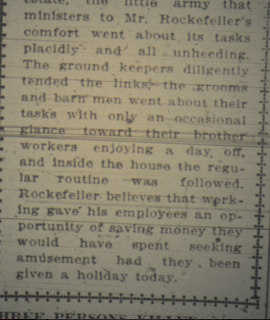
Friday, November 15, 2013
Tuesday, September 3, 2013
Rockefeller was a dick
Here is an excerpt from the Los Angeles Times from September 2, 1913.
WORK TO DO ON HOLIDAY
Rockefeller Holds that His Employees Are The Better Off
By Direct Wire to the Times
CLEVELAND (O) Sept 1


Work as an antidote for extravagance is John D. Rockeffeller's system, and he put the plan into operation Labor Day when all the employees at Forest Hill worked. Although a stream of holiday folk passed by the estate, the little army that ministers to Mr. Rockefellers comfort went about its tasks placidly and all unheeding.
The ground keepers diligently tended the links, the grooms and barn men went about their tasks with only an occasional glance toward their brother workers enjoying a day, off and inside the house the regular routine was followed. Rockefellers believes that working gave his employees an opportunity of saving money they would have spent seeking amusement had they been given a holiday today.


Wednesday, August 21, 2013
Saturday, January 26, 2013
WAL MART-MEh
I see a lot of people that are "pro business" use the term '"economy". These people who are pro business seem to like insurance companies, health care companies, and WAL-MART. Personally, I don't think these people understand the use of the term "economy".
Economy is a big term with a big meaning, but is thrown around loosely. Essentially, economy is the trading and consumption of goods and services. Willing participants engage in arms lengths transactions. An argument exists that large companies like WAL-MART provide jobs, but they do not factor in account other variables that play on society. For instance, WAL MART's strength lies in the fact it uses aggressive sales margins to increase volume in it's stores.
Increased volume increases overall bottom line and is used in negotiation to decrease supplier prices. Moreover, WAL-MART purchases many of it's goods overseas where American workers cannot compete. This is because our government enacts certain environmental, social (entitlement programs )and quality protections to ensure that American products maintain certain levels of quality. While enjoying the legal fiction of corporate person hood, WAL-MART acts as the class bully in school that doesn't know when to stop. A WAL-MART in a community diminishes people's chances to individually trade and consume goods and services due to it's ability to provide nearly every item at a lower price point. Hence, WAL-MART becomes the juggernaut in the neighborhood and attracts people from other communities to spend money in it's store. While some local communities may benefit from having a WAL-MART in the town by virtue of the increased tax dollars, the tangible loss may be from loss of otherwise possibly vibrant businesses. Neighboring communities, sensing that a WAL-MART is coming to town, will compete in incentives to increase the likelihood that Wal Mart will come to their town because the store indeed will produce benefits for the city.
Now, when observed on the county level, what happens is WAL MART tends to depress living standards in the communities nearby. Communities without WAL MARTS will have their citizens spend the money in the neighboring towns. Instead of money flowing back into the community through local business, the money in the community is shipped back to Bentonville, and through the various Chinese suppliers that provide the cheaper goods that WAL MART sells. Hence a WAL MART redistributes a community's wealth. Because public health has a large impact on a society's productivity, WAL MART enjoys two considerable public subsidies. The first is many people who rely on government checks will tend to try to get the most value out of their money and shop based on price points. WAL MART-the community juggernaut, will tend to offer one stop shopping for all the things a person can possibly need. Well intentioned citizens believe that buying things keep the economy going, but exactly what economy?. Neighboring communities tend to suffer because they are stifled for tax revenues from their businesses, and their constituents spend in the neighboring town. The other hidden public subsidy that WAL MART has enjoyed is that it is known for offering a less than livable wage without public benefits. By styming unions, WAL MART has employed a win at all costs to keep prices low model. Backstage Sam's Club motivational literature details this same language. "Winning". Once again, health care must be examined at the county level.
Communities that have WAL MARTS may have enjoy benefits from the increased tax revenues that come from a WAL MART; however, communities that do not have WAL MARTS may have to rely on public services due to the cycle of money outflows that WAL MART exacerbates. Granted, this is a not a one size fits all model as there are plenty of communities that can absorb a WAL MART, especially those in rural places where money is imported in from exported goods (think farm communities). However, in urban places where the functions of business have more integrated social effects on larger populations, there is indeed a high cost to low prices.
Wednesday, January 9, 2013
A post falsely attributed to Mark Twain
My biggest problem in life has been confusing the suggestive aspects of "should" against the punitive aspects of "shall".
Quote Michael Nitzani
1/9/2013
Subscribe to:
Comments (Atom)
